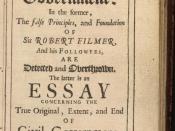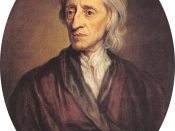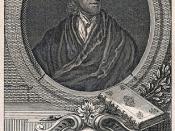One of the most influential philosophers of the Enlightenment and liberal political theory, John Locke's ideas and political philosophy have been the subject of intense debate, thought and discussion for centuries. The most direct reading of Locke's political philosophy finds the concept of consent playing a central role. Key to Locke's ideas is the notion of the social contract, which establishes a framework for civil society, the establishment of the state, and the rights of individuals within the state. The establishment of civil society, for Locke, hinges on individual consent as the mechanism by which political societies are created and individuals join those societies. Consent then, is crucial in Locke's political theory as all of his main arguments stem from the notion - it is however debatable whether the types of consent that he discusses, particularly the idea of tacit consent, align themselves both to reality and to the thesis of his ideas.
Nonetheless, it is clear that the idea of consent is a driving force behind John Locke's political theory, and one which needs to be examined and analysed in understanding his ideas.
The state of nature, as it was for Hobbes, is an integral aspect of Locke's political theory. Like Hobbes he assumes all men were born free and equal but Locke's natural man is more sociable and able to reason than Hobbes imagined. Like Hobbes, again, he hypothesises a state of nature, but whereas Hobbes employed the state of nature in a purely hypothetical sense, Locke is eager to show that such a state did and can exist. Unlike Hobbes, however, this state of nature is guided by a law of nature which God intended man to understand through their powers of reasoning. It is distinctly different to Hobbes' notion of the state of nature, which in...


